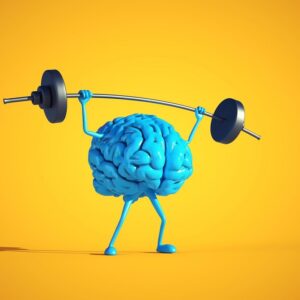Fitness Training for Mental Mojo
Mental Fitness
For some time, scientists have known that the brain, like any muscle with fitness training, grows stronger and more efficient with use. But researchers have recently learned that neural links develop and particularly strengthen when we do difficult tasks and basically screw up instead of having success with easier tasks. This can be something physically athletic like learning to cartwheel on the balance beam or a creative task such as learning to play the violin. This explains why our intelligence is not set in a certain way or fixed, and to improve our intelligence, or mental mojo, is by embracing tasks that we find particularly difficult and then experience failure.
Mindsets: Fixed or Growth
However, some care to differ. Stanford University’s Dr. Carol Dweck, an expert on mindsets, found that people usually adhere to 1 of 2 mindsets: fixed or growth. The fixed mindset is set by genes, people are either highly intelligent or not. Growth mindsets claim that intelligence and capability can be developed through effort, struggle and experience failure.
Dweck claims that people with a fixed mindset are likely to drive their focus on tasks where they had a high success rate and stay clear from tasks where they have had to struggle and experience failure, which in turn limits their learning. People with a growth mindset, however, welcome challenges, and know that learning outcome and intellectual growth occurs when they push themselves with hard work, and experience failure.
Fitness Training For Mental Mojo
Interestingly researchers have recently discovered that mindsets are malleable. For our ability to perform a creative or physically athletic task, that mental mojo can be developed and taught with so called “growth mindset interventions.” Seemingly harmless comments can have long term implications for someone’s mindset.
The most effective recipe of praise for a personal trainer to give their clients or as a teacher to give their student is to focus on:
- Improving
- Strategies
- Learning
- Struggle
- Process
- Effort
- Choices
- Persistence despite tough setback
- Choosing difficult tasks instead of easy ones
A good example is praising someone’s process (“I really admire how hard you pushed yourself to solving that tough fitness theory problem”) versus a personal trainer praising a talent or innate trait (“You’re so naturally ripped and fit!”). The praise of process acknowledges the pain, effort and struggle; the praise of talent secures the notion that a person only succeeds or does not based on a fixed trait.
We at Infofit have seen this fitness training for mental mojo success as well with our students. They are encouraged to spend more time learning by challenging quizzes and fitness certification exams through either tutoring, or with the personalized 1 on 1 course, and with the apprenticeship fitness training program. After being exposed to error and failure, the positive messages of praise for their pain, struggle and hard work conditions their brains to grow strong and respond faster, not just on the newly learned tasks, but also more efficient and speedier on new unlearned ones.
The good news for anyone struggling to master fitness theory, you should keep this in mind, Infofit provides unprecedented support and access to content to be an expert professional in the fitness industry. So, the next time you are challenging hard to follow programs, don’t reprimand yourself repeatedly for screwing up that fitness training quiz or exam, after a few hard tries, you will rocket fuel your brain to remember that piece, drive you to learn faster and move far closer to become a certified personal trainer.
-
 Mental Training 101 Podcast$15.75
Mental Training 101 Podcast$15.75

